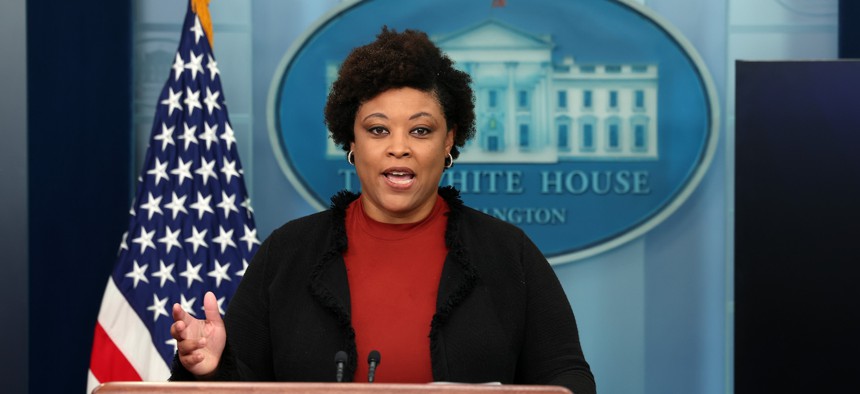Biden's $1.67 trillion budget boosts tech, AI

White House Budget Director Shalanda Young, shown here briefing reporters last September, said the Biden administration's budget request reflects the vision laid out in the recent State of the Union address. Kevin Dietsch/Getty Images
The Biden administration’s FY2025 budget request provides agencies with $3 billion “to responsibly develop, test, procure and integrate transformative AI applications across the federal government.”
President Joe Biden’s proposed fiscal year 2025 federal budget would direct significant funding toward agencies’ adoption of artificial intelligence technologies, while also boosting spending to modernize outdated government services and enhance cybersecurity practices as part of a broader effort to promote U.S. leadership and innovation.
In a press call on Monday, Office of Management and Budget Director Shalanda Young said the request for $1.67 trillion in discretionary spending for fiscal year 2025 builds on the vision laid out in Biden’s March 7 State of the Union address by focusing, in part, on “expanding and protecting access to health care, supporting America's workforce and boosting manufacturing, confronting the climate crisis while spurring clean energy innovation, providing national paid leave, advancing cancer research, making our communities safer and more.”
The budget includes $850 billion in defense spending, up $34 billion from 2023 enacted levels. Non-defense discretionary funding is $770 billion. If mandatory spending items like Medicare, Social Security and other obligations are lumped in, the fiscal year budget totals $7.3 trillion.
The budget also includes a proposed 2% pay increase for federal employees.
AI and emerging technologies
The budget includes significant investments to advance Biden’s October 2023 executive order on the safe and secure development of AI, which officials framed as a key component of efforts to ensure continued U.S. tech leadership.
An OMB spokesperson told Nextgov/FCW that the budget “provides over $3 billion across agencies in order to responsibly develop, test, procure and integrate transformative AI applications across the federal government,” and also proposes $300 million “in mandatory funding to increase agency funding for AI, both to address major risks and to advance its use for public good.”
The funding proposal also seeks to invest $20 billion “across major research agencies” to drive further innovative efforts spurred on by passage of the 2022 CHIPS and Science Act, an increase of $1.2 billion from allocated 2023 funding. The White House’s budget notes that this funding would, in part, help support AI-related activities at the National Institute of Standards and Technology, as well as funding for the National Science Foundation to invest in emerging technologies that include AI and quantum information science.
Further AI-focused funding includes $70 million for agencies to create “chief AI officers accountable for their agency’s use of AI, adopt new AI technologies to improve government services and establish minimum safeguards for government use of AI to protect the rights and safety of the public.”
The FY25 request also seeks to enhance agencies’ IT systems and public-facing services to better assist Americans and the federal workforce, including through the adoption of new digital systems.
This includes $2.7 billion for the Office of Federal Student Aid — an increase of $625 million above 2023’s enacted level — to, in part, allow FSA “to continue to modernize its digital infrastructure and ensure the successful administration of its financial aid programs.”
Additional notable investments include $6.2 billion allocated for the Department of Veterans Affairs’ Office of Information and Technology to “continue upgrades to information technology systems to enable faster benefits delivery and easier access to medical care services.”
Cybersecurity
The 2025 budget also invests in federal cybersecurity initiatives and earmarks funding for enforcement agencies to go after cybercriminals.
An increase of $25 million is requested for the FBI to support counterintelligence operations against hacking groups, as well as cyber response capabilities. Some $5 million is also requested for the Justice Department’s national security division to clamp down on cyber threats.
The FBI in recent months has announced operations that have hit major nation-state hacking groups tied to Russia and China, likely motivating the White House to provide the agency with more funds to cover the costs of taking down hacking threats seeking to cripple U.S. infrastructure and other sensitive targets.
$13 billion is also earmarked for the civilian agency space in an effort to enhance the security of public services. An additional $103 million is devoted to DHS’ Cybersecurity and Infrastructure Security Agency, granting it a total of $3 billion for the fiscal year.
Some $394 million is requested for the CISA’s internal cyber and analytical capabilities, while $41 million and $116 million are marked for critical infrastructure security coordination and critical infrastructure cyber event reporting, respectively.
The budget broadly devotes $800 million to the U.S. “national security workforce” that would include support for zero trust architecture implementations, up 17% from the previous year’s request.
The request also considers enterprise cybersecurity, providing $150 million for the Cybersecurity Enhancement Account which supports the Treasury Department’s cyber capabilities. $396 million is also devoted to the Bureau of the Fiscal Service that aims to enhance the security of key government financial systems.
Tech modernization
The Biden administration is also seeking to add $75 million to the Technology Modernization Fund, a pot of no-year money housed at the General Services Administration and spent on tech upgrades at federal agencies. The fund got a $1 billion plus-up under the American Rescue Plan Act, but annual appropriations have been diminishing over the years since the legislation establishing the fund was enacted.
According to GSA's budget justification, TMF "is on track to allocate the vast majority of current funds…and is planning to announce several large value investments in the first half of 2024."
Relatedly, the administration is also seeking $97 million to add to the Federal Citizen Services Fund, a GSA effort that supports governmentwide technology improvement and shared services. Additionally, the administration is seeking the authority to collect $26 million in agency contributions — giving the fund an overall FY2025 increase of $123 million. This request comes as the $150 million in ARPA funding for the fund has expired.
While the budget reflects many of the Biden administration’s most pressing concerns, it faces daunting odds of enactment in a divided Congress. Young contrasted the White House’s funding priorities, however, with those of Republicans to try and draw a clear contrast in some key election year issues.
“The president's vision of progress, opportunity and fairness is in stark contrast with congressional Republicans who have repeatedly fought to slash critical programs the American people count on and increase the deficit by trillions of dollars with giveaways to Big Pharma, the wealthy and big corporations,” she said on Monday’s call.
Nextgov/FCW cybersecurity reporter David DiMolfetta and executive editor Adam Mazmanian contributed to this article.
